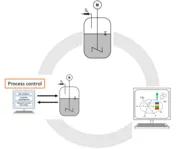ProPHet2Con: Control and characterization of population heterogeneity in microbial L-phenylalanine production
Population heterogeneity is a commonly observed phenomenon in industrial bioprocesses that can occur independently of the organism under investigation. Reduced mixing and higher viscosity often occur in industrial-scale processes, resulting in the formation of gradients in the bioreactor. This exposes the cells to different environmental conditions depending on their position in the bioreactor. Because of this, an originally isogenetic monoculture may evolve into a culture with different phenotypes to compete against the dynamic environment. This, in turn, can lead to reduced productivity, yield, growth, or increased byproduct formation. In contrast, however, population heterogeneity may cause cells to develop greater stress tolerance as they adapt to changing environmental conditions.
The aims of this research project are to characterize and control changes in process performance during L-phenylalanine production with recombinant Escherichia coli in a fed-batch process caused by population heterogeneity. To simulate the process, a coarse-grained model is used to describe the cell. This can then be coupled to an agent-based model for the reactor depending on the condition (ideal and non-ideal mixing).
In order to better characterize and control population heterogeneity in the process, computer-aided methods are used in the first step to optimize the process. Subsequently, soft sensors will be developed to determine non-measurable process variables. Furthermore, the soft sensors will be used for model-based process control. Both theoretical and practical work will be carried out in this project.
Project supervisor: M.Sc. Lucas Hermann
Project start date: 15.05.2023
